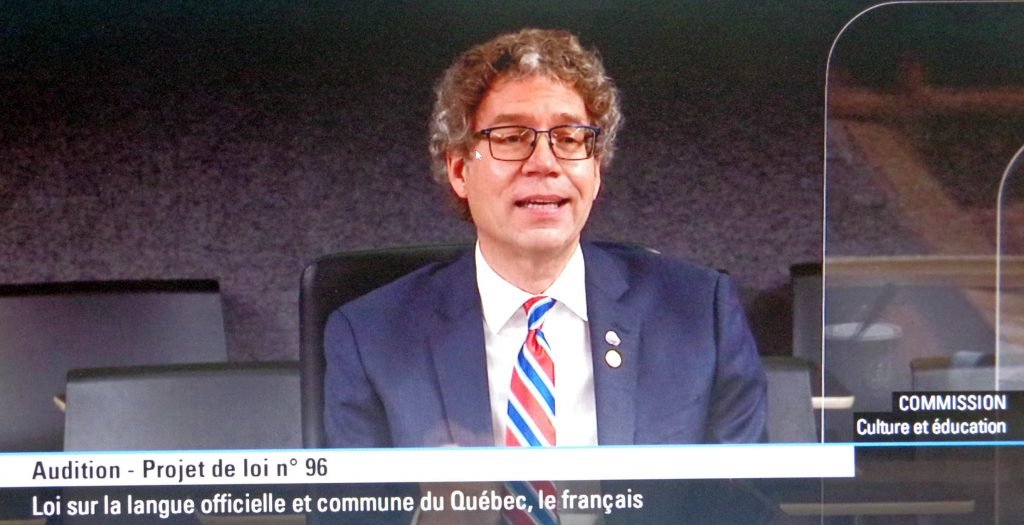‘You don’t believe there is a decline in French,’ language minister tells Anglo school boards
In a brief presented by the Quebec English School Boards Association to officials in Quebec City last week during public hearings on the CAQ government’s controversial updating of Bill 101, the QESBA recommended that several sections of the Quebec Charter of Human Rights and Freedoms and the Canadian Charter of Rights and Freedoms be removed from Bill 96 when invoking the “notwithstanding” clause.
Not by infringing
“The Quebec English School Boards Association and our nine English language school boards believe in the need to promote and protect the French language in Québec and indeed throughout Canada,” QESBA president Dan Lamoureux and executive-director Russell Copeman said in the 16-page document they tabled.
“We were the pioneers of French immersion, bilingual programs and now what we call Français Plus. We ensure the success in French for all our students and prepare them to live and work in Québec with pride.
“But that protection and promotion should not be done by setting aside the fundamental rights of Quebecers, nor by infringing on the rights of the English-speaking community of Québec. We ask that the government reconsider some of the provisions of Bill 96.”
‘Never been more French’
Although the QESBA acknowledged that the French language is in a minority position in Canada and North America, and that the QESBA recognizes that legislative, regulatory and collective efforts are needed to protect and promote French in Quebec and Canada, they said they felt compelled to observe, while citing corroborating statistics, that by many measurable criteria “Québec has never been more French than today.”

As well, the brief continued, “the protection and promotion of the French language in Québec should not be done by infringing on the Québec Charter of Human Rights and Freedoms,” nor “at the expense of the rights of English-speaking Quebecers and their institutions, including our Constitutional rights to control and manage our school system by virtue of section 23 of the Canadian Charter of Rights and Freedoms.”
A basic incompatibility
Regarding Section 159 of Bill 96, which unilaterally amends Canada’s Constitution Act of 1867 by adding sections stating “Quebecers form a nation” and “French shall be the only official language of Québec” and “the common language of the Québec nation,” the QESBA said “this section of Bill 96 seems to be incompatible with section 133 of the Constitution Act 1867 which allows bilingualism in the Québec legislature and in federal and Québec courts.”
In addition to these claims, the QESBA maintained that proposed new restrictions in Bill 96 on eligibility for English schooling could adversely affect enrolment in the Anglophone system and discourage foreign nationals from moving to Quebec.
Impact on enrollment
Bill 96 seeks to amend the Charter of the French Language to specify that English-language education certificates for dependent children of foreign nationals temporarily living in Quebec will apply for three years only. Under the present system, the certificates can be renewed as long as the status of the parent remains unchanged.
Although the amendment would affect only foreign nationals, the QESBA asked the government to scrap the clause because of the potential effects on already dwindling enrolment in the English school system. They said it would also hurt Quebec’s ability to recruit foreign talent.
QESBA mute on French decline
Quebec Minister Responsible for the French Language Simon Jolin-Barrette asked Copeman whether the QESBA recognizes that the use of French in Quebec has been declining. “We are not demographers or sociologists,” Copeman replied, basically repeating what the QESBA stated in its brief.
“As we stated in our memo, we will not get drawn into a discussion on the relative decline of French … Are there situations on the island of Montreal? Are there situations elsewhere? Possibly, but this is not our area of expertise. We are here to talk about the impact of Bill 96 on the school network.”
French threatened, said minister
Jolin-Barrette persisted. “So, as I understand it, you don’t believe there is a decline in French,” he said. “Because in Quebec society now, there is quite a bit of consensus to the effect that effectively statistical studies demonstrate – whether it’s the OQLF or the Conseil supérieur de la langue française – that there is a decline in French and that French will continue to decline if no measures are taken.
“So, I understand that your organization is not specialized in demographic data. But does your organization acknowledge this decline?” Copeman suggested he had little choice but to give approximately the same answer to what was essentially the same question rephrased.
And the Quebec Nation?
However, the Minister Responsible for the French Language hadn’t finished. Noting that the English Montreal School Board (the largest member of the QESBA) had recently denied in a resolution the idea of Quebec being a nation, Jolin-Barrette said he was curious to know what the QESBA thought of that position.
‘The protection and promotion of the French language in Québec should not be done by infringing on the Québec Charter of Human Rights and Freedoms,’ said the QESBA
“I think that even as the chairman of the English Montreal School Board himself admitted, the initial resolution was ill-advised,” Copeman responded.
“This is a conclusion that we share. And the council of commissioners at the English Montreal School Board manifestly came to the conclusion that the resolution was ill-advised, because they annulled it. So, for me that’s the end of the story.”



